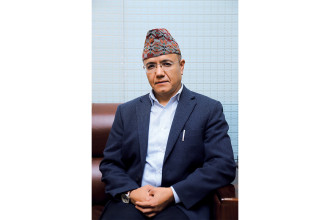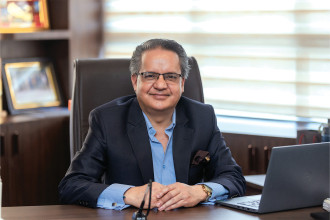
Gyanendra Malla is the newly appointed Captain of the Nepali National Cricket Team. He is a right-handed top order batsman who has amassed multiple national records and has made an influential mark for the game in Nepal since his debut for the country against Namibia in March 2006.
Malla has represented Nepal in Under-15, Under-17 and Under-19 levels. He was one of the 11 cricketers to play for Nepal during the country’s first ever One Day International (ODI) match against Netherlands in 2018 after receiving an ODI status. Additionally, he became the seventh Nepali cricketer to score an international century scoring 114 runs off 125 balls against Singapore. He recently set the record of the fastest century in domestic cricket history scoring 100 runs in just 37 balls.
In a conversation with B360’s Avant Shrestha, the new appointed captain opens up about leadership, his career and his passion for cricket and country.
What would you have been if not a cricketer?
As far as I can tell, when talking about Gyanendra Malla, whatever I have received and achieved I owe it to cricket. Up until now, cricket has given me a lot. I don’t think I would have done anything other than playing cricket. I think my life ambition is and has always been cricket. And I feel like cricket is everything to me.
What is your definition of a leader?
A leader is someone who helps motivate the group to move forward together. A leader leads by example both on and off the field. It is basically about believing in your team and teammates and setting an example. A leader helps to express the true nature of the team and helps make decisions that benefit the team.
What motivates you as a leader?
For me it’s always our country. I don’t think there are other bigger motivation factors other than playing for Nepal. I strongly believe that playing for Nepal and winning matches for the country should not only be a motivating factor for me but for the entire team and our fans as well.
In fact, cricket has reached such a standard in Nepal that I feel like all the Nepali people are influential in this matter. There are so many people who have had the dream of playing for the national team and helped us win, however only a few actually got to play. I feel honored that this game has given me the opportunity so my main motto and motivation factor is to always help my team and my country perform better and win on the field.
How would you describe your leadership style?
I am vocal in my beliefs and I try to express as much as I can for the benefit of the team.
We are a growing cricketing nation and to reach the level of top teams, we need patience. We should be able to take these facts into account and move forward. I try not to pinpoint the positives and negatives within the team, or that of my fellow professionals and the junior players; instead I lay out the facts and based on that, we plan accordingly. We should appreciate the progress we have been making in the game but at the same time we have to mind the facts.
Is there a leader in the cricketing world you look up to?
I have never given it thought from the leadership angle. When I started playing cricket, I never thought that I would reach this level and as a result I never thought that I should present myself or try to emulate the stuff others in leadership positions did. But I was always focused on my personal responsibility to the team and the country. I was focused on my duty and always motivated myself to stick to my present duty.
When I started playing cricket, there were club captains and senior members of the team who through cricket and in cricketing terms taught us how to lead. As I recall it was a wonderful opportunity for me to learn because at that time cricket was very new. So I learnt a lot by just looking at my seniors. Rather than looking at international players and trying to emulate them, I look for the positive qualities of these players and started implementing them in my life and in my game.
Of course, there are players like Sachin Tendulkar and Rahul Dravid in international cricket and Roger Federer in tennis who have left their mark in sporting history. I do admire their achievements but I never thought much about being a leader of such caliber. Besides, as a leader I believe that you need to have your own individual thoughts.

As the national captain what kinds of responsibilities have been added to your shoulders?
Firstly, I am honored to be the captain, but I have not felt much of the difference because the core team set up is the same. Yes, responsibility has obviously increased but at the same time more opportunities have come my way. Personally, I never enjoyed being the focal point, I rather prefer being behind the scenes. But as the captain, it is my responsibility to be at the center of everything. Of course, there are extra responsibilities because everyone’s attention is on the captain. The captain’s responsibility is listening to everyone’s opinion, being vocal, making key decisions and taking them forward. However, as a player playing for the national team there is no added responsibility because every player shares the same responsibility, which is working your hardest in training and matches and making sure your country wins.
What are the major challenges Nepali cricket is facing?
There are lots of challenges. First of all, the Cricket Association of Nepal (CAN) was in suspension for three and a half years and I think those were crucial years that we lost. The suspension caused a huge hindrance in our development and in the domestic cricket front as well because CAN was supposed to manage our development and they were responsible to monitor and manage domestic cricket and the players as well. But on a positive note, government and private sector was able to encourage cricket in Nepal.
Currently, we have achieved ODI (One Day International) status which is unprecedented and very new to us so we have to take this and venture into new territories which will be a pleasant challenge for us. We need to capitalise on our ODI status and plan on how we can make the best campaign to qualify for the World Cup. We have to set our roles and objective immediately.
Another challenge is revival of domestic cricket, taking cricket to the grass-root level and implementing it in schools and colleges so that we can generate new players. In addition, establishing cricket grounds in other major cities in Nepal and taking the reach of cricket in those areas are our other challenges. It is essential that we become strong in these departments. But we need to have patience and I believe we have to work to achieve this from now.
What is the future for Nepali Cricket?
The future looks very good. The fact that we are in the ODI cycle is a huge achievement not only for cricket but also for Nepali sports. We have to capitalise on this but we have to continue to improve. If we continue our progress, we could even play against India or Pakistan in the near future.
Plus, there is a huge craze in Nepal for sports. The amount of support we have received from fans and the corporate sector is integral to our development and I truly believe cricket can be number 1 sports in Nepal in terms of commercial value and in terms of career value for the players. I think if everything works out, sports and cricket can be a viable career path for many.
What values are most important as a leader for?
I believe that one should be responsible towards their duty and complete that. Education is very important; I think that should be number one priority if you are playing any sports. I think we have to think about improving our country no matter what field we are in. You need not be a doctor or an engineer to make Nepal great. I think each and every individual has helped make Nepal what it is today; big or small job doesn’t matter as long as you do your job with honesty.




-(1)-1752214965.jpg)